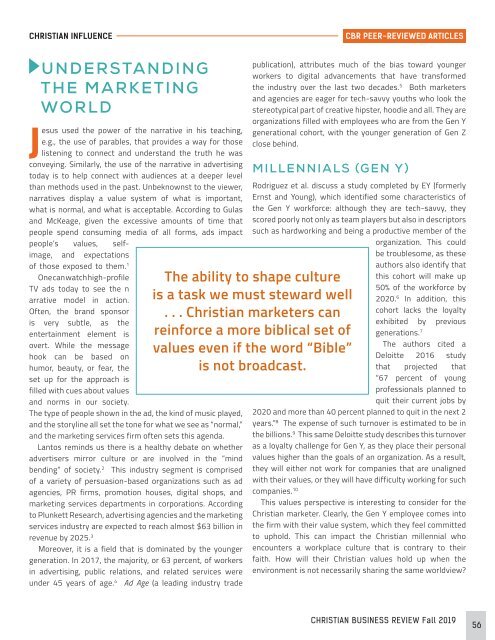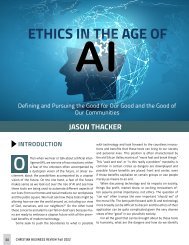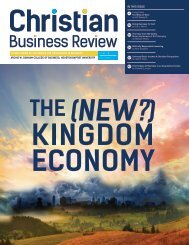Christian Business Review 2019: Workplace Practices That Glorify God (Issue 8)
You also want an ePaper? Increase the reach of your titles
YUMPU automatically turns print PDFs into web optimized ePapers that Google loves.
CHRISTIAN INFLUENCE<br />
CBR PEER-REVIEWED ARTICLES<br />
UNDERSTANDING<br />
THE MARKETING<br />
WORLD<br />
Jesus used the power of the narrative in his teaching,<br />
e.g., the use of parables, that provides a way for those<br />
listening to connect and understand the truth he was<br />
conveying. Similarly, the use of the narrative in advertising<br />
today is to help connect with audiences at a deeper level<br />
than methods used in the past. Unbeknownst to the viewer,<br />
narratives display a value system of what is important,<br />
what is normal, and what is acceptable. According to Gulas<br />
and McKeage, given the excessive amounts of time that<br />
people spend consuming media of all forms, ads impact<br />
people’s values, selfimage,<br />
and expectations<br />
of those exposed to them. 1<br />
One can watch high-profile<br />
TV ads today to see the n<br />
arrative model in action.<br />
Often, the brand sponsor<br />
is very subtle, as the<br />
entertainment element is<br />
overt. While the message<br />
hook can be based on<br />
humor, beauty, or fear, the<br />
set up for the approach is<br />
filled with cues about values<br />
and norms in our society.<br />
The type of people shown in the ad, the kind of music played,<br />
and the storyline all set the tone for what we see as “normal,”<br />
and the marketing services firm often sets this agenda.<br />
Lantos reminds us there is a healthy debate on whether<br />
advertisers mirror culture or are involved in the “mind<br />
bending” of society. 2 This industry segment is comprised<br />
of a variety of persuasion-based organizations such as ad<br />
agencies, PR firms, promotion houses, digital shops, and<br />
marketing services departments in corporations. According<br />
to Plunkett Research, advertising agencies and the marketing<br />
services industry are expected to reach almost $63 billion in<br />
revenue by 2025. 3<br />
Moreover, it is a field that is dominated by the younger<br />
generation. In 2017, the majority, or 63 percent, of workers<br />
in advertising, public relations, and related services were<br />
under 45 years of age. 4 Ad Age (a leading industry trade<br />
publication), attributes much of the bias toward younger<br />
workers to digital advancements that have transformed<br />
the industry over the last two decades. 5 Both marketers<br />
and agencies are eager for tech-savvy youths who look the<br />
stereotypical part of creative hipster, hoodie and all. They are<br />
organizations filled with employees who are from the Gen Y<br />
generational cohort, with the younger generation of Gen Z<br />
close behind.<br />
MILLENNIALS (GEN Y)<br />
Rodriguez et al. discuss a study completed by EY (formerly<br />
Ernst and Young), which identified some characteristics of<br />
the Gen Y workforce: although they are tech-savvy, they<br />
scored poorly not only as team players but also in descriptors<br />
such as hardworking and being a productive member of the<br />
organization. This could<br />
be troublesome, as these<br />
authors also identify that<br />
this cohort will make up<br />
50% of the workforce by<br />
2020. 6 In addition, this<br />
cohort lacks the loyalty<br />
exhibited by previous<br />
generations. 7<br />
The authors cited a<br />
Deloitte 2016 study<br />
that projected that<br />
“67 percent of young<br />
professionals planned to<br />
quit their current jobs by<br />
2020 and more than 40 percent planned to quit in the next 2<br />
years.” 8 The expense of such turnover is estimated to be in<br />
the billions. 9 This same Deloitte study describes this turnover<br />
as a loyalty challenge for Gen Y, as they place their personal<br />
values higher than the goals of an organization. As a result,<br />
they will either not work for companies that are unaligned<br />
with their values, or they will have difficulty working for such<br />
companies. 10<br />
This values perspective is interesting to consider for the<br />
<strong>Christian</strong> marketer. Clearly, the Gen Y employee comes into<br />
the firm with their value system, which they feel committed<br />
to uphold. This can impact the <strong>Christian</strong> millennial who<br />
encounters a workplace culture that is contrary to their<br />
faith. How will their <strong>Christian</strong> values hold up when the<br />
environment is not necessarily sharing the same worldview?<br />
CHRISTIAN BUSINESS REVIEW Fall <strong>2019</strong><br />
56 2














